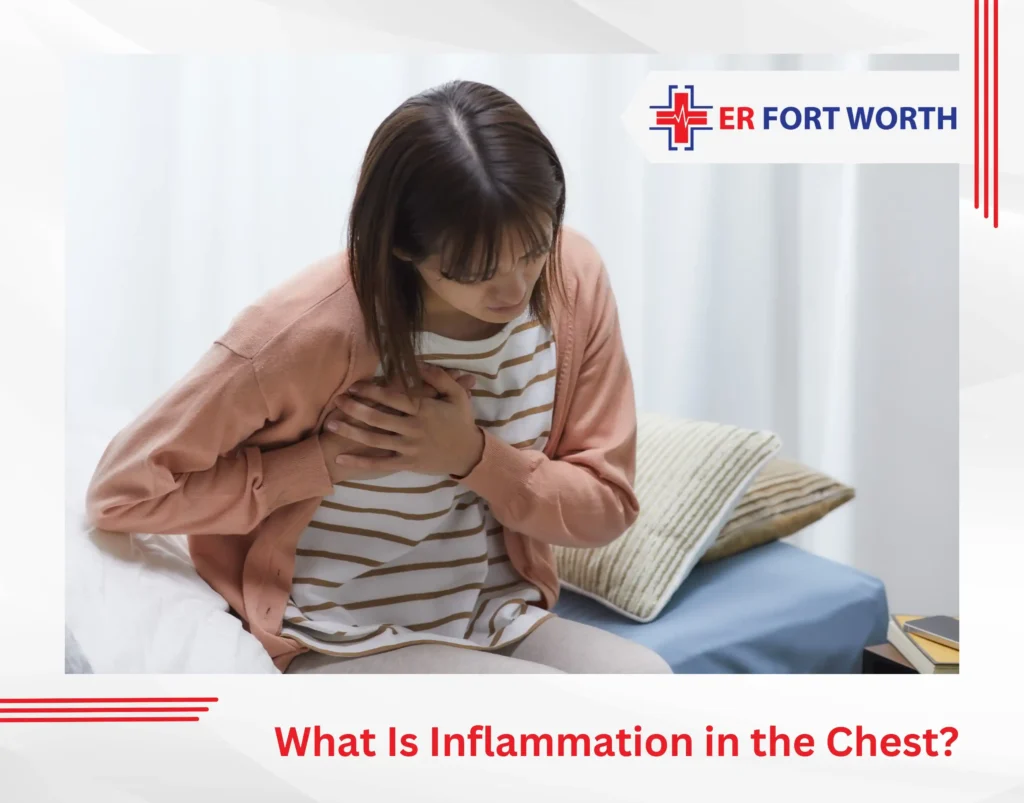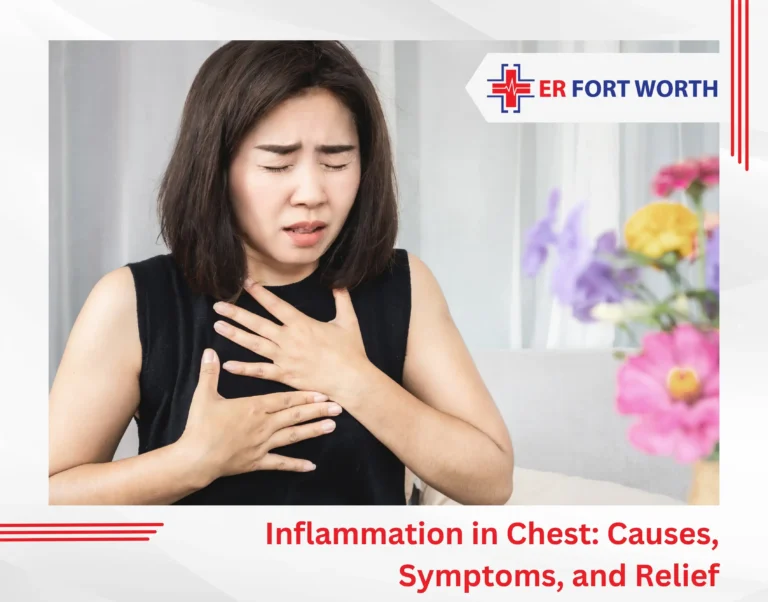You wake up feeling fine, but by afternoon, there’s a strange tightness or burning in your chest. It’s not quite heartburn, and it’s not exactly painful, but it’s enough to make you anxious.
If this sounds familiar, you might be dealing with inflammation in chest. It’s a common issue that can be caused by anything from a stubborn cold to muscle strain or irritation in the lung lining. Knowing what’s behind the discomfort can bring both clarity and relief.
What Is Inflammation in Chest?

Inflammation in chest refers to the body’s immune response to injury, infection, or irritation in the chest area. This response can affect your lungs, the lining around your lungs, chest muscles, ribs, and surrounding tissues.
When inflammation occurs, your body sends extra blood and immune cells to the affected area. This causes the typical symptoms: chest pain, swelling, and sometimes warmth or tenderness when you touch the area.
Your body creates this inflammatory response to protect itself and start the healing process. However, chest inflammation can become problematic when it persists too long or becomes severe, potentially leading to complications without proper treatment.
Common Causes of Chest Inflammation
Respiratory Infections
One of the most frequent causes of inflammation in chest is respiratory tract infections. Bacterial, viral, and fungal infections can trigger inflammatory responses in the lungs and surrounding tissues. Pneumonia, bronchitis, and upper respiratory infections commonly lead to lung inflammation and associated chest pain. These infections cause the immune system to mobilize white blood cells and other inflammatory mediators to the affected area.
Pleurisy
Pleurisy, also known as pleuritis, is a condition characterized by inflammation of the pleura; the thin membrane that lines the chest cavity and covers the lungs. This condition is a significant cause of chest inflammation and typically results in sharp, stabbing chest pain that worsens with breathing or coughing. Pleurisy can be caused by various factors, including viral infections, bacterial infections, autoimmune disorders, or certain medications.
Autoimmune Conditions
Several autoimmune disorders can cause inflammation in chest. Conditions such as rheumatoid arthritis, lupus, and scleroderma can lead to inflammation of the lungs, pleura, and other chest structures. These conditions occur when the immune system mistakenly attacks healthy tissues, resulting in chronic inflammation and associated symptoms.
Environmental Factors
Exposure to environmental irritants and pollutants can trigger chest inflammation. Cigarette smoke, air pollution, occupational chemicals, and allergens can cause inflammatory responses in the respiratory system. Long-term exposure to these irritants can lead to chronic inflammatory conditions affecting the chest.
Gastroesophageal Reflux Disease (GERD)
GERD can contribute to inflammation in the chest by causing stomach acid to reflux into the esophagus and potentially reach the respiratory tract. This acid exposure can trigger inflammatory responses and lead to symptoms that mimic other chest conditions.
Symptoms Associated with Chest Inflammation
Chest Pain
Chest pain is a prominent symptom of inflammation in the chest. The pain can vary in character, ranging from sharp and stabbing to dull and aching. The location and intensity of chest pain often depend on the underlying cause of inflammation. In cases of pleurisy, the pain is typically sharp and worsens with deep breathing or coughing.
Chest Tightness
Many individuals with chest inflammation experience chest tightness, which can feel like a band wrapped around the chest or difficulty expanding the chest fully during breathing. This chest tightness often accompanies other respiratory symptoms and can be particularly noticeable during physical activity or when lying flat.
Breathing Difficulties
Inflammation in chest can impact breathing patterns. Patients may experience shortness of breath, difficulty taking deep breaths, or a feeling of breathlessness even during minimal exertion. These breathing difficulties occur because inflammation can affect the normal functioning of the lungs and respiratory muscles.
Cough
A persistent cough is another common symptom of chest inflammation. The cough may be dry or productive, depending on the underlying cause. In cases of lung inflammation, the cough often produces sputum that may be clear, yellow, green, or even blood-tinged.
Fever and Systemic Symptoms
When inflammation in chest is caused by infections, patients often experience fever, chills, fatigue, and general malaise. These systemic symptoms indicate that the body is mounting an immune response to combat the underlying cause of inflammation.
How Is Chest Inflammation Diagnosed?

Physical Examination
The diagnostic process for chest inflammation starts with a thorough physical examination. A healthcare provider listens to the chest with a stethoscope to detect abnormal breath sounds, assess breathing patterns, and evaluate chest wall movement. Palpation of the chest can help identify areas of tenderness or swelling associated with inflammation.
Imaging Studies
Chest X-rays are commonly used to evaluate inflammation in the chest. These images can reveal signs of lung inflammation, pleural effusions, or other abnormalities. In some cases, computed tomography (CT) scans provide more detailed images of chest structures and can help identify specific causes of inflammation.
Laboratory Tests
Blood tests can provide valuable information about inflammatory markers, infection indicators, and overall health status. Complete blood counts, inflammatory markers such as C-reactive protein and erythrocyte sedimentation rate, and specific tests for autoimmune conditions may be performed.
Specialized Tests
Depending on the suspected cause, additional lab tests may be necessary. These might include sputum cultures, pleural fluid analysis, pulmonary function tests, or bronchoscopy to directly visualize the airways and collect samples for analysis.
Treatment Options for Chest Inflammation

Anti-inflammatory Medications
The treatment of inflammation in chest often involves anti-inflammatory medications. Nonsteroidal anti-inflammatory drugs (NSAIDs) such as ibuprofen or naproxen can help reduce inflammation and associated pain. In more severe cases, corticosteroids may be prescribed to provide more potent anti-inflammatory effects.
Antibiotics
When bacterial infections cause inflammation in chest, antibiotics are the primary treatment. The specific antibiotic chosen depends on the suspected or confirmed bacterial pathogen. It’s important to complete the full course of antibiotics as prescribed to ensure complete eradication of the infection.
Supportive Care
Supportive care measures play a crucial role in managing chest inflammation. These may include rest, adequate hydration, humidified air, and pain management. Breathing exercises and chest physiotherapy may help improve lung function and reduce symptoms.
Treatment of Underlying Conditions
For inflammation in chest caused by underlying conditions such as GERD or autoimmune disorders, treating the primary condition is essential. This may involve acid-suppressing medications for GERD or immunosuppressive drugs for autoimmune conditions.
How to Prevent Inflammation in the Chest
Lifestyle Modifications
Preventing chest inflammation often involves lifestyle changes. Quit smoking, avoid exposure to environmental irritants, maintain good hygiene, and manage underlying health conditions to reduce the risk of chest inflammation.
Vaccination
Stay up-to-date with vaccinations, particularly those for respiratory infections such as influenza and pneumonia, to prevent some causes of chest inflammation.
Regular Medical Care
Regular check-ups with healthcare providers can help identify and manage risk factors for chest inflammation before they become problematic.
When to Seek Medical Attention
If you’re experiencing persistent chest pain, chest tightness, difficulty breathing, or other concerning symptoms, it’s important to seek medical care right away. While some causes of chest discomfort can be treated with routine care, others may require immediate intervention to prevent serious complications.
At the ER of Fort Worth, we provide fast, expert emergency care 24/7. Using the latest diagnostic technology, including advanced imaging and rapid testing, our team can quickly evaluate your condition and begin the right treatment without unnecessary delays.
FAQs
1. What does chest inflammation feel like?
Chest inflammation typically causes sharp or aching pain that worsens when you breathe deeply, cough, or move. You may also experience tightness, tenderness when touching the chest area, and difficulty taking full breaths.
2. How long can chest inflammation last?
Mild chest inflammation from muscle strain usually resolves within 3-7 days. Inflammation from infections may last 1-2 weeks with proper treatment. Chronic conditions can cause recurring episodes lasting weeks to months without medical management.
3. Can stress and anxiety cause inflammation in chest?
Stress doesn’t cause true inflammation but can create chest tightness and pain through muscle tension and rapid breathing. However, chronic stress may weaken your immune system, making you more prone to respiratory infections that do cause chest inflammation.
4. Are there specific foods that can reduce inflammation in the chest?
Foods rich in omega-3 fatty acids (salmon, walnuts), antioxidants (berries, leafy greens), and vitamin C (citrus fruits) may help reduce inflammation. Avoid processed foods, excess sugar, and alcohol to support healing.
5. Can exercise worsen chest inflammation, or is it beneficial?
Light walking and gentle stretching can help chest inflammation by improving circulation. Avoid intense exercise during acute episodes, as it may worsen pain and breathing difficulties. Resume normal activity gradually as symptoms improve.
6. Can recurring chest inflammation indicate a more serious underlying condition?
Yes. Frequent chest inflammation episodes may signal chronic conditions like asthma, autoimmune disorders, or recurring infections. Persistent or repeated symptoms require medical evaluation to identify underlying causes and prevent complications.




